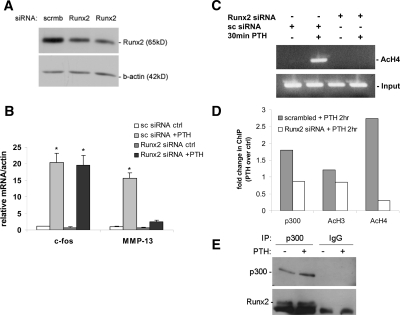Figure 6.
Knockdown of Runx2 decreases PTH-stimulated histone H4 acetylation, MMP-13 transcription, and recruitment of p300 to the MMP-13 promoter. UMR 106-01 cells were transfected with either 20 nm Runx2 siRNA or control scrambled siRNA for 72 h, treated with rat PTH (peptide 1–34; 10−8 m) and then analyzed by (A) Western blot using Runx2 antibody or β-actin as a loading control, (B) real-time RT-PCR using the c-fos and MMP-13 primers, or ChIP assays using anti-Ac-H4 (C and D), or anti-Ac-H3, or anti-p300; the PCR primers were from the MMP-13 promoter, −204/−34, and the PCR products were separated on 2% agarose gels or real-time PCR was performed and the values normalized to input and expressed as fold-stimulation over the respective control. The input samples (cross-linked and not immunoprecipitated chromatin) were 1/100 of the amount used for immunoprecipitation. E, UMR cells were treated with rat PTH (peptide 1–34; 10−8 m) for 1 h, then p300 immunoprecipitated, and the Western blot reacted with anti-Runx2 showing that Runx2 associates with p300 in these cells. Error bars represent the sd of three independent experiments. *, P < 0.001 compared with the vehicle-treated control. Ac, Acetylated; ctrl, control; IP, immunoprecipitation; scrmb, scrambled.

